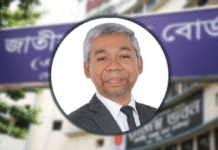Japan is aiming to deepen its relationship with Bangladesh ahead of China, a Tokyo-based Asian business review has reported.
It published the report ahead of Prime Minister Shinzo Abe’s first visit to Dhaka.
Nikkei Asian Review, an English language business journal of one of the largest Japanese media corporations Nikkei Inc, said Japan would help Bangladesh build an industrial base that includes scores of infrastructure projects.
It said Prime Minister Abe would discuss those plans with his counterpart Sheikh Hasina during his Dhaka visit.

File photo from Prime Minister Sheikh Hasina’s visit to Japan in May 2014
The foreign ministry officials in Dhaka earlier told bdnews24.com that Abe would come on Sep 6 on a 24-hour visit.
His sojourn would follow Hasina’s May visit when he pledged 600 billion Yen –$5.7 billion – in official development assistance over the next four to five years.
Hasina also visited China, a week after her return from Japan, where the leadership also offered huge assistance for building a number of infrastructures.
The Asian Review gave details of the upcoming Japanese projects, most of which had already been discussed.
It said Japan would support the creation of an industrial area in Bangladesh near the Bay of Bengal.
It will focus on the region linking the capital Dhaka with Matarbari near the major port city of Chittagong, featuring a series of infrastructure projects and a special economic zone for Japanese companies.
Plans to set up the special economic zone in the Dhaka area will be solidified as early as this fiscal year, it said.
The Japanese government is expected to provide some 40 billion yen in support.
“A 15 billion yen fund will be set up by next fiscal year, and a special-purpose company will be established to build an industrial park.”
“Tokyo will help with infrastructure construction and corporate financing as well,” it said.

According to the report, Japan will also offer loans for building railways and expressways between cities and assist in constructing urban infrastructure in Dhaka and Chittagong.
The area around a coal-fired power plant in Matarbari will be given priority for development as well, it said.
The report gave a picture of Bangladesh’s economy and said Bangladesh had worked “to strengthen ties with its neighbours, including Myanmar, where foreign companies have grown more active, and India with its massive population of 1.2 billion.”
“Japan sees it as a relatively easy location to concentrate industry with an eye toward nearby markets.”
“Tokyo also aims to deepen its relationship with Bangladesh ahead of China, whose investment there has been limited,” according to the report.
“If Japan’s official development assistance to Bangladesh is ramped up, it could become a major aid recipient in line with Vietnam, which has received more than 100 billion yen a year, and Myanmar, which is expected to get around 100 billion yen.”
The number of Japanese companies operating in Bangladesh has doubled over the past five years to around 180 in April.
But its main industries are agriculture and textiles, and power shortages and an inadequate transportation network remain issues, the Asian Review wrote.
Source: Bd news24









